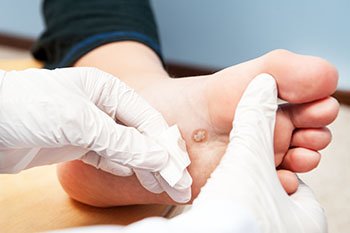
Patients often ask podiatrists how plantar warts grow on the feet. The answer is slightly complicated. These warts can grow and develop on the bottoms or soles of the feet typically from exposure to the human papillomavirus (HPV). Often the HPV can enter the skin through some sort of existing cut or opening. As a result, the HPV can facilitate uncontrolled cellular growth, which ultimately leads to the development of a wart. Plantar warts are unique in that they can create a hole in the bottom of the feet. Some plantar warts can be particularly painful for patients. Other cases of plantar warts might even be itchy. If you are currently suffering from plantar warts, it is suggested that you schedule an appointment with a podiatrist today who can help you address any problems you might have from this infection.
Plantar warts can be very uncomfortable. If you need your feet checked, contact Howard Abramsohn, DPM from Ambulatory Foot and Ankle Associates, LLC. Our doctor will assist you with all of your foot and ankle needs.
About Plantar Warts
Plantar warts are the result of HPV, or human papillomavirus, getting into open wounds on the feet. They are mostly found on the heels or balls of the feet.
While plantar warts are generally harmless, those experiencing excessive pain or those suffering from diabetes or a compromised immune system require immediate medical care. Plantar warts are easily diagnosed, usually through scraping off a bit of rough skin or by getting a biopsy.
Symptoms
- Lesions on the bottom of your feet, usually rough and grainy
- Hard or thick callused spots
- Wart seeds, which are small clotted blood vessels that look like little black spots
- Pain, discomfort, or tenderness of your feet when walking or standing
Treatment
- Freezing
- Electric tool removal
- Laser Treatment
- Topical Creams (prescription only)
- Over-the-counter medications
To help prevent developing plantar warts, avoid walking barefoot over abrasive surfaces that can cause cuts or wounds for HPV to get into. Avoiding direct contact with other warts, as well as not picking or rubbing existing warts, can help prevent the further spread of plantar warts. However, if you think you have developed plantar warts, speak to your podiatrist. He or she can diagnose the warts on your feet and recommend the appropriate treatment options.
If you have any questions please feel free to contact our office located in Mt Laurel Township, NJ . We offer the newest diagnostic and treatment technologies for all your foot and ankle needs.
